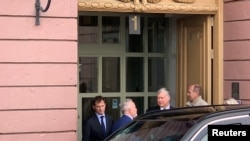U.S. President Donald Trump’s decision to tap Steve Biegun, the special representative for North Korea, as deputy secretary of state could spur Washington’s denuclearization talks with Pyongyang, said experts.
“[Biegun’s] in a position now where he will have much more influence, and he will be able to guide things from a senior level at the State Department to really help shape policy, even more than as … a special representative for North Korea,” said David Maxwell, a senior fellow at the Foundation for Defense of Democracies.
The White House announced Trump has nominated Biegun for the No. 2 spot at the State Department on Thursday, and soon after announced the Biegun nomination had been sent to the Senate.
If the Senate approves his nomination, Biegun will replace John Sullivan, who was nominated to serve as the next U.S. ambassador to Russia. Biegun would then be the second highest-ranking official at the State Department after Secretary of State Mike Pompeo.
If Pompeo steps down from his post to run for a Senate seat as widely speculated, then Biegun would serve as acting secretary of state.
As the deputy secretary, Biegun will continue in his role of overseeing diplomacy with North Korea, a senior U.S. official said.
Experts think Biegun’s nomination signals the Trump administration’s effort to elevate the significance of engaging in talks with North Korea.
“Making him the deputy secretary of state raises his stature and so it naturally raises the level of working level negotiations that he will continue to lead,” said Maxwell.
Joseph DeTrani, who served as the Special Envoy for the six-party denuclearization talks with North Korea during the George W. Bush administration, said, “I think that means the president and our secretary of state are putting more attention to the issue of North Korea.”
Biegun has been leading working-level talks with North Korea since his appointment as the special representative for North Korea in August 2018. Progress in the talks between Washington and North Korea have been slow due to their differences over the process of denuclearization and sanctions relief.
Working-level talks resumed in Stockholm in early October after months of stalled negotiations since the breakdown of the second summit between Trump and North Korean leader Kim Jong Un in Hanoi in February. But the Stockholm talks fell apart after North Korea walked away from the negotiating table.
Robert Manning, a senior fellow at the Atlantic Council, said no matter who leads diplomatic efforts for the U.S, North Korea will not give up nuclear weapons.
“Kim is not testing all these missiles and quietly working on improving his nuclear weapons because he wants to give everything away,” said Manning.
North Korea conducted what it called “super-large multiple rocket launchers” on Friday in its 12th missile test since May. The short-range missiles that North Korea has been testing this summer are considered more advanced than those tested prior to its diplomatic outreach toward the U.S. in 2018.
Manning thinks Biegun’s nomination could suggest that the Trump administration anticipates the talks with North Korea will continue to make slow progress.
“There may be a subtle message in his promotion to deputy secretary – which I think will be a great benefit to the Department of State – which is that they don’t expect the North Korea diplomacy to move very quickly,” said Manning.
However, Maxwell thinks Biegun will be able to create the right conditions for diplomacy to induce North Korea to denuclearize.
“If anyone can create the conditions, the diplomatic conditions for Kim Jong Un to make the right strategic decision to give up its nuclear weapons, it’s Steve Biegun,” said Maxwell, adding, “the ball is in Kim Jong Un’s court.”
Biegun’s nomination comes with a wide-ranging support from former U.S. officials and North Korea experts, according to the endorsement list issued by the State Department on Thursday.
Ashton Carter, who served as secretary of defense under the Obama administration, said “Steve Biegun is a man of integrity and breadth of vision who has always represented the best of American policymaking.”
Joel Wit, senior fellow at the Stimson Center who was involved in past negotiations with the North Koreans while at the State Department, said, “I fully support Stephen Biegun’s nomination. As special representative for North Korea, Steve has carried out his duties with great skill and determination, ably representing U.S. interests with the North Koreans, working closely with our allies, the Republic of Korea and Japan, and seeking to build support from other important countries, China and Russia, for American policy. I believe these same diplomatic skills make Steve the right choice to be our new Deputy Secretary of State.”
Previously, Biegun served as executive secretary of the National Security Council and chief of staff of the Senate Foreign Relations Committee. Prior to serving as Trump’s North Korea envoy, Biegun worked as vice president of international governmental relations for Ford Motor Company.







